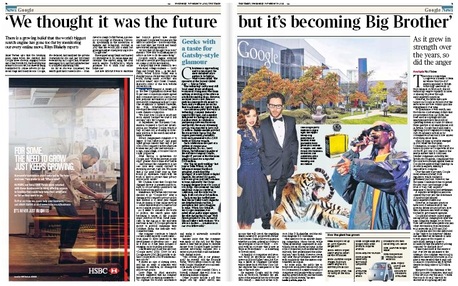This week the Mail has reported that Russian websites are watching British families through their computer webcams and streaming their lives online.
Is this any more or less sinister than GCHQ monitoring our emails and phone calls? Or than police following and keeping dossiers on people not suspected of breaking any laws?
We fret about privacy and security online and update our Facebook status with toothless assertions as to our copyright. But we don't read the T&Cs when we sign up for a new service or app. We allow our computers to remember our passwords, which means we forget them ourselves. We joke about the funeral, dating or slimming ads that crop up on our pages, and become irritated when ads for something we bought online a couple of weeks ago keep appearing. If you're so damn clever Mr Internet, you should know I've got this, and don't need another one.
And when we sign up for a new app or program, we happily "sign in with Twitter" to avoid the faff of having to create another new profile and another immemorable password - thus giving the newbie access to shedloads of personal information just so that we can play Scrabble or Candy Crush with minimum fuss.
"I'd like to join your network," says a LinkedIn email from someone you've never heard of, but who seems to be quite important in their field. If they're grand enough and there are enough shared contacts, we might succumb. Madness.
Last week four people in America started a class action against LinkedIn for sharing information with potential employers - a service the website actively promotes by telling businesses: "Get the real story on any candidate” and “find references who can give real, honest, feedback”.
Away from the computer, we collect "loyalty" cards whose real purpose is not to reward customers for consistent patronage, but to spy on their shopping habits, to conduct market research on the cheap.
It's all pretty frightening. Some might even choose to liken it to Big Brother (Orwell, not Endemol). As The Times did on Wednesday.
There is no news story to justify this glorified case study, nor indeed, is there evidence to back up the page one write-off:
Google is facing a boycott by a rising number of people who say that they have lost control over the way the internet search giant collects and uses their personal data.
The newsiest bit of the piece is a Pew Organisation poll that found that 91% of Americans surveyed felt they had lost control of how personal information was collected "by companies such as Google".
This survey of 607 adults was published on November 12. Its purpose was to see how people's perceptions of privacy and security may have changed since the Snowden revelations. The 91% statistic was highlighted as its most striking finding.
Setting aside the fact that the sample was small, let us look at what the survey report had to say on the question of personal information. Indeed, let us reproduce that section in full:
| An overwhelming majority of the American public senses a loss of control over how their personal information is collected and used by companies Beyond social networking sites, Americans express a broader loss of control over the way their personal data is managed by companies. Fully 91% of adults “agree” or “strongly agree” that “consumers have lost control over how personal information is collected and used by companies.” This includes 45% who “strongly agree” and 46% who “agree” that consumers have lost control. Another 6% “disagree,” while only 1% “strongly disagree” with this sentiment. Those with a college education are more likely than those who have not attended college to “strongly agree” that consumers have lost control, 51% vs. 40%. Respondents who are more aware of government surveillance programs also express a greater loss of control over how their personal information is collected and used by companies. Those who said they had heard a lot were more likely to “strongly agree” with a loss of control over their personal information compared with those who had heard “a little” or “nothing” about surveillance programs (58% vs. 37%). Most Americans support greater regulation of advertisers and the way they handle personal information Even as Americans express concern about government access to their data, they feel as though government could do more to regulate what advertisers do with their personal information; 64% believe the government should do more to regulate advertisers, compared with 34% who think the government should not get more involved. Support for more regulation of advertisers is consistent across an array of demographic groups. However, those who have a college education are more likely than those who have not attended college to support more government intervention (69% vs. 58%). |
The Times story goes on to say that Google spent more in donations to midterm political campaigns than Goldman Sachs and that its financing projects aimed at finding a cure for Parkinson's and a pill to beat cancer. It might also have mentioned that it is running an Ebola appeal in which it gives $2 for every dollar donated.
Much is made, as might be expected, of the "don't be evil" motto and the big picture panel and sidebar focus on exotic parties, tigers, Stevie Wonder - as though young men anywhere in the world who found themselves with riches unimagined might behave differently.
The analysis in the outside column mentions tax avoidance and the search results suppressed under the "right to be forgotten" rule - without mentioning that this is happening as a result of the failure of Google's appeal against a European ruling. Yes, it's censorship. But it's also obeying European law.
What many Times readers must wonder when they come across this spread is "What's this all about?"
There is no doubt that the pervasiveness of Google is troubling. It is a subject worthy of proper consideration. The whole question of our privacy needs looking at in depth. But this isn't it.
Google is the biggest player in the game and the knives are out. Earlier this month an organisation called Public Citizen published a paper called Mission Creep-y, which also addressed the company's growing influence. The video below shows a television discussion of that research.
Funnily enough, News Corp's chief executive Robert Thomson had written to Alumunia a couple of weeks earlier urging just such a course of action. Google, Thomson said, was a platform for piracy. It was an "egregious" aggregator that was "willing to exploit its dominant market position to stifle competition".
Google swiftly responded - and here is the FT's presumably impartial take on the spat.
News Corp wasn't taking any risks, and last month James Murdoch joined in during a session at the Mipcom television conference in Cannes:
I think there’s no question that they can do more. A lot more. Certainly Google’s not right in saying they’re doing more than anyone. That just isn’t true. The problem with Google… Actually, let’s not personalise this. The problem with search-driven discovery, if the content is there and it’s illegal and you’re just selling clicks as a big ad network, you have eery incentive for that illegal programming to be there… That’s fundamentally not really good enough.
NSA privacy invasion bad, but nothing compared to Google.
— Rupert Murdoch (@rupertmurdoch) August 17, 2014 "Please expose Eric Schmidt, Google " etc. Just wait!
— Rupert Murdoch (@rupertmurdoch) October 13, 2013 Piracy leader is Google who streams movies free, sells advts around them. No wonder pouring millions into lobbying.
— Rupert Murdoch (@rupertmurdoch) January 14, 2012 The German publisher Axel Springer is equally unenchanted with the boys from Silicon Valley. In April its chief executive Mathias Döpfner published an open letter to Google chief Eric Schmidt in Frankfurter Allgemeine Zeitung saying he was afraid of Google, and accusing it and Facebook of having a "totalitarian mentality like the Stasi or other secret police in service of a dictatorship". It wanted, he wrote, to create “superstate that can navigate its floating kingdom undisturbed by any and all nation-states and their laws”.
In an interview with the Columbia Journalism Review this week Döpfner identified a divergence of opinion between America and Europe. The Americans thought Europeans were backward-looking and failed to understand that the tech economy was based on data.
Europe, he said, knew from history that total transparency and total control of data led to totalitarian societies.
The Nazi system and the socialist system were based on total transparency. The Holocaust happened because the Nazis knew exactly who was a Jew, where a Jew was living, how and at what time they could get him; every Jew got a number as a tattoo on his arm before they were gassed in the concentration camps
But as an observer of journalism, I found The Times's out-of-the-blue spread unsatisfying. The associated leader was quite restrained, emphasising the point that people do have a choice whether to use Google. Maybe John Witherow was not entirely comfortable with the note struck by his master's voice, yet felt obliged to beat the corporate drum.
There is a big issue here to be tackled journalistically, but it requires an overarching approach and heavy investment in personnel and money - both resources in short supply.
Who can look at the entire question of privacy, personal security and surveillance without being accused of having a vested interest?
Someone needs to.









 RSS Feed
RSS Feed


